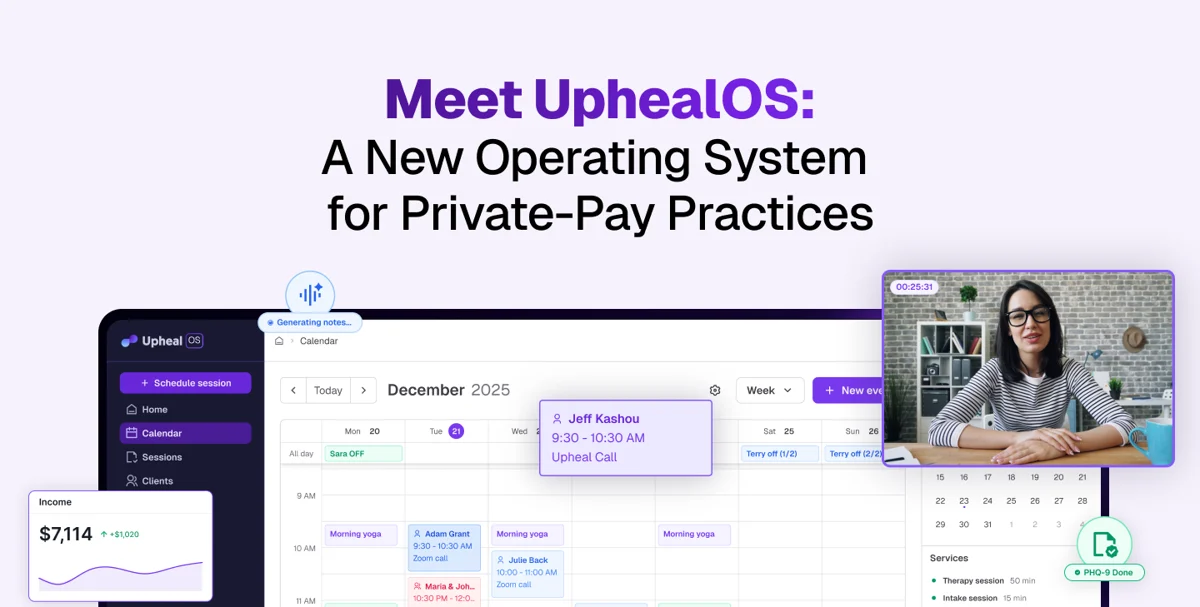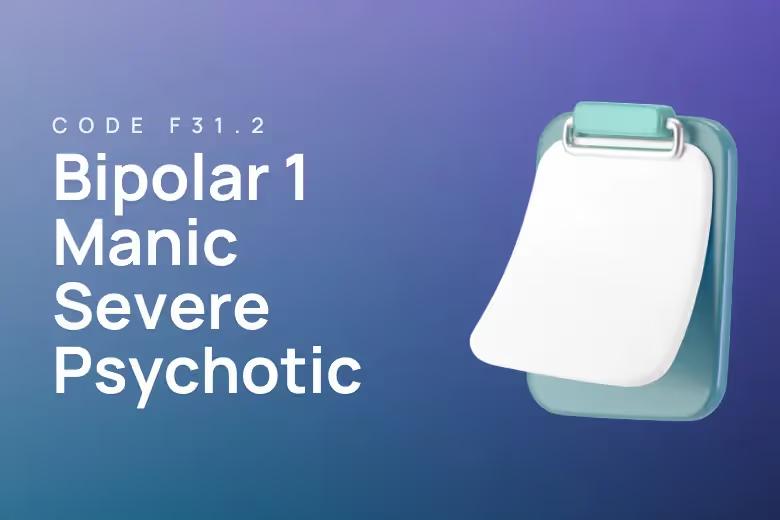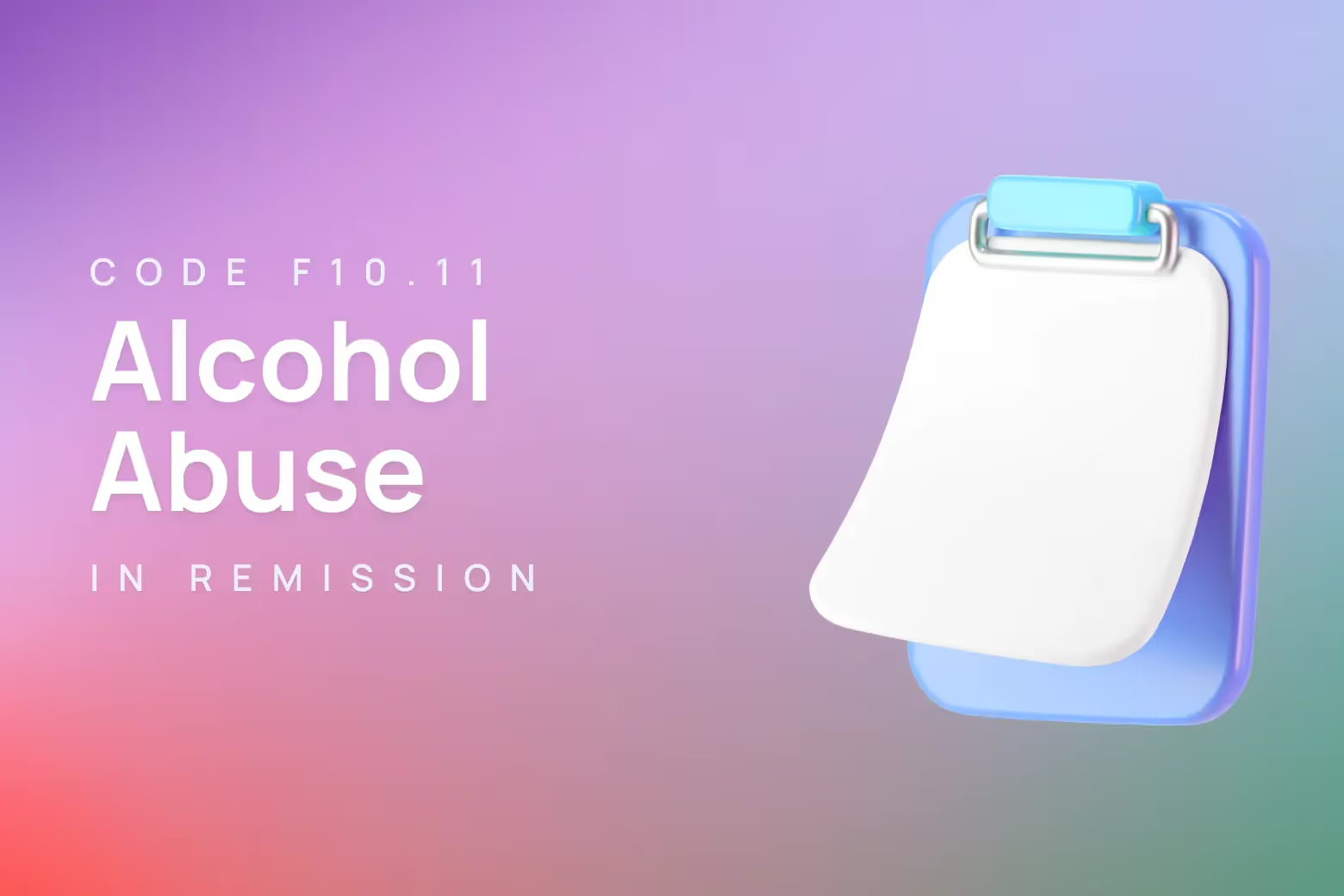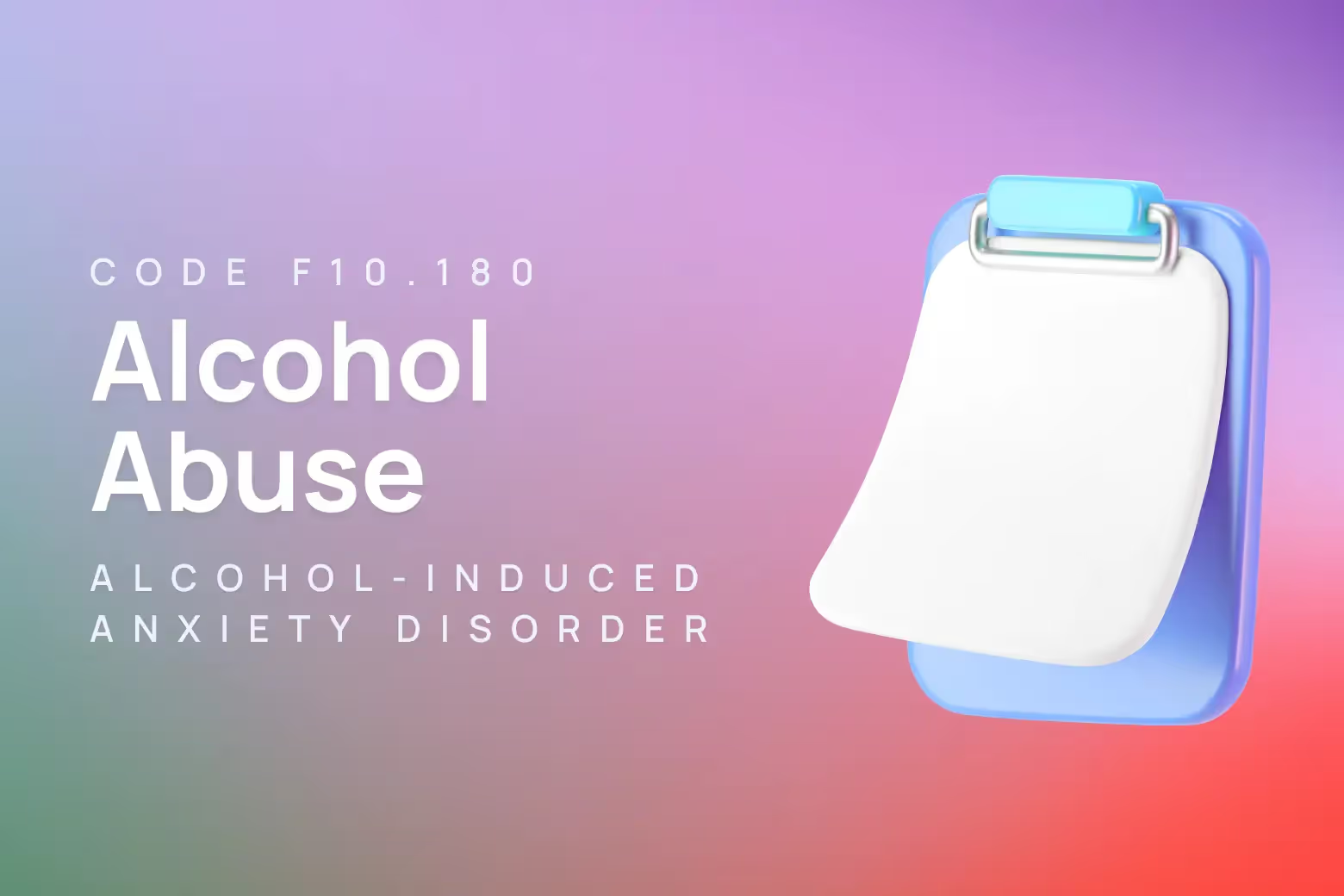ICD-10 code for alcohol use, unspecified with alcohol-induced sleep disorder
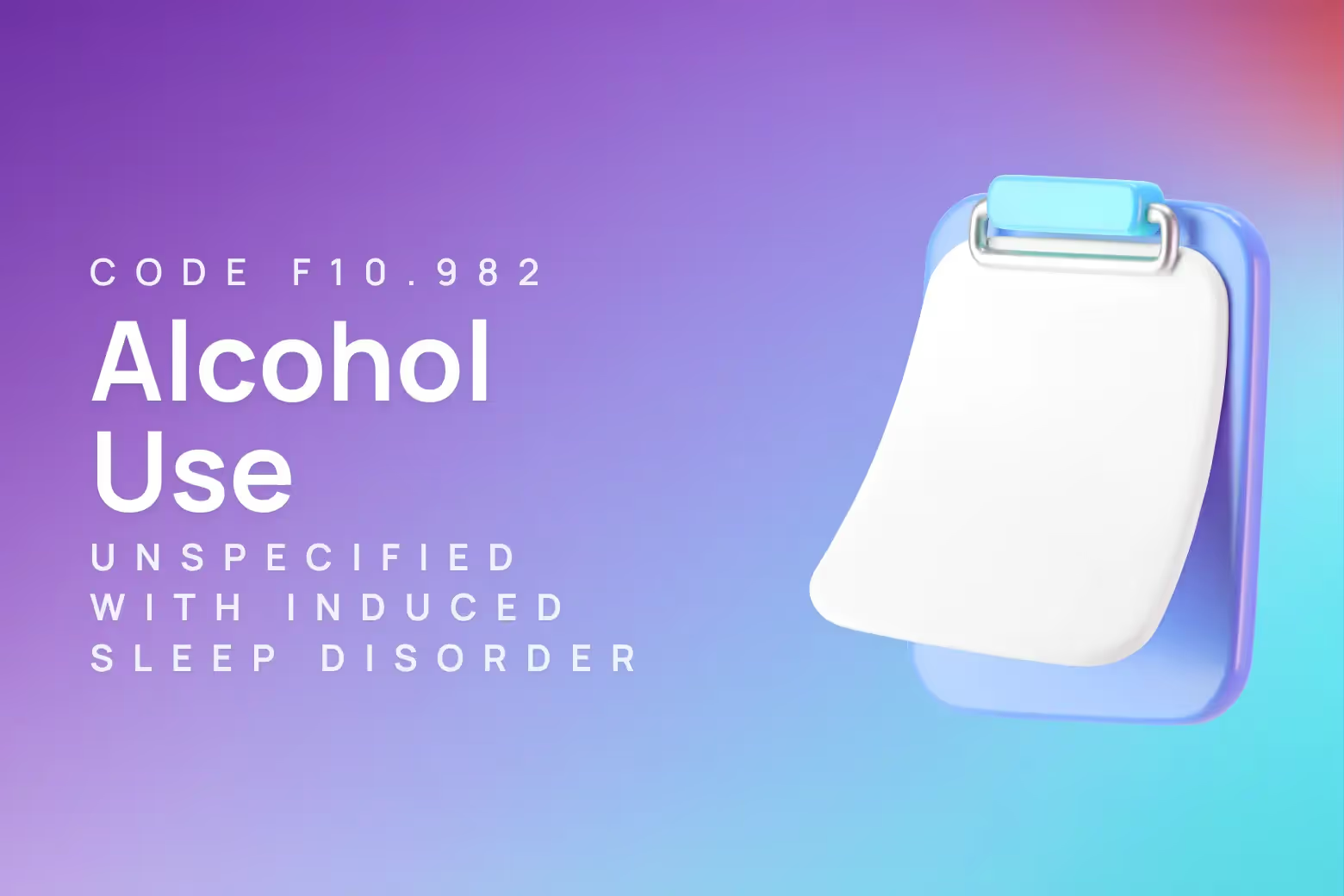
F10.982 is the ICD-10 code for alcohol use, unspecified with alcohol-induced sleep disorder.
This diagnostic code applies when an individual experiences sleep disturbances directly caused by alcohol consumption, but the severity of alcohol use cannot be specified as mild, moderate, or severe.
Accurate diagnosis and proper coding ensures appropriate treatment planning while meeting insurance requirements for continued care authorization.
Key features:
- Represents alcohol-induced sleep disruptions without specified alcohol use disorder severity
- Encompasses various sleep problems including insomnia, hypersomnia, and sleep rhythm disruption
- Requires documented relationship between alcohol consumption and sleep difficulties
- Guides treatment toward both substance use intervention and sleep disorder management

Diagnostic criteria for alcohol use, unspecified with alcohol-induced sleep disorder (F10.982)
Clinicians must establish that sleep disturbances developed during or within one month of alcohol intoxication or withdrawal, or result from medication used to treat alcohol-related conditions.
The sleep disorder causes clinically significant distress or functional impairment that warrants independent clinical attention.
Evidence must show that alcohol consumption patterns preceded or coincided with sleep symptom onset.
The sleep disturbance should not be better explained by another sleep disorder, medical condition, or mental health disorder that is not alcohol-related.
Key diagnostic requirements include:
- Sleep difficulties that occur in close temporal relationship to alcohol use
- Sleep symptoms that cause significant functional impairment or distress
- Evidence that alcohol consumption directly contributes to sleep problems
- Sleep disturbances that persist beyond typical intoxication or withdrawal periods
- Ruling out other potential causes of sleep disruption
When to use F10.982 diagnosis code
Proper differential diagnosis becomes critical when distinguishing F10.982 from related alcohol-induced disorders and determining when the unspecified severity designation applies most appropriately.
F10.982 vs F10.280 (Alcohol dependence with alcohol-induced sleep disorder)
The primary distinction lies in the documented severity of alcohol use patterns. F10.982 applies when clinicians cannot determine whether the alcohol use meets criteria for mild, moderate, or severe alcohol use disorder, often due to insufficient information or limited assessment opportunities.
F10.280 specifically requires documentation of moderate to severe alcohol use disorder with at least four symptoms present within a 12-month period. This includes evidence of tolerance, withdrawal, unsuccessful attempts to control use, and significant life impairment.
F10.982 vs F10.182 (Alcohol abuse with alcohol-induced sleep disorder)
F10.182 applies specifically to mild alcohol use disorder cases with documented presence of 2-3 alcohol use disorder symptoms. This code requires clear evidence of problematic alcohol use patterns that haven't progressed to moderate or severe levels.
F10.982 serves as the appropriate choice when alcohol use clearly contributes to sleep problems, but the clinician lacks sufficient information to specify the exact severity level of alcohol involvement.
F10.982 vs G47.9 (Sleep disorder, unspecified)
While both codes address sleep difficulties, F10.982 specifically establishes the causal relationship between alcohol use and sleep symptoms.
G47.9 would be inappropriate when alcohol consumption clearly contributes to sleep disturbances, as it fails to capture this important clinical relationship.
Related ICD-10 codes
- F10.98 Alcohol use, unspecified with other alcohol-induced disorders
- F10.980 Alcohol use, unspecified with alcohol-induced anxiety disorder
- F10.981 Alcohol use, unspecified with alcohol-induced sexual dysfunction
- F10.988 Alcohol use, unspecified with other alcohol-induced disorder
Interventions and CPT codes for alcohol use with sleep disorder
Cognitive Behavioral Therapy for Insomnia (CBT-I)
Research demonstrates that psychological interventions, particularly CBT-I, show superior effectiveness compared to pharmacological approaches for treating alcohol-related sleep problems.
CBT-I addresses both the cognitive and behavioral factors that perpetuate sleep difficulties while avoiding medications that could worsen alcohol use outcomes.
This evidence-based approach helps individuals develop healthy sleep behaviors, challenge dysfunctional beliefs about sleep, and establish sustainable sleep routines that support recovery.
The structured protocol typically includes sleep hygiene education, stimulus control, sleep restriction, relaxation training, and cognitive restructuring techniques.
CPT codes for CBT-I sessions:• 90832 Psychotherapy, 30 minutes• 90834 Psychotherapy, 45 minutes
• 90837 Psychotherapy, 60 minutes
Sleep hygiene education and psychoeducation
First-line interventions focus on teaching fundamental sleep hygiene principles while addressing how alcohol disrupts normal sleep architecture.
Clients learn about alcohol's impact on REM sleep, sleep onset, and sleep maintenance while developing practical strategies for better sleep without relying on substances.
Educational components cover sleep environment optimization, consistent sleep-wake schedules, limiting daytime napping, and avoiding caffeine, nicotine, and alcohol close to bedtime.
This psychoeducational approach provides the foundation for more intensive interventions.
CPT codes for psychoeducation:• 90832 Psychotherapy, 30 minutes• 90834 Psychotherapy, 45 minutes
Alcohol use disorder treatment
Comprehensive treatment addresses both alcohol use patterns and sleep difficulties through integrated approaches.
Motivational interviewing techniques help clients explore ambivalence about changing drinking behaviors while cognitive-behavioral interventions target the skills needed for sustained recovery.
Treatment planning considers how sleep problems may trigger alcohol use as a coping mechanism, while alcohol consumption perpetuates sleep difficulties.
This cycle requires coordinated intervention strategies that address both conditions simultaneously.
CPT codes for alcohol use treatment:• 90791 Psychiatric diagnostic evaluation
• 90832/90834/90837 Individual psychotherapy sessions• 90853 Group psychotherapy• 99408 Alcohol screening and brief intervention, 15-30 minutes• 99409 Alcohol screening and brief intervention, >30 minutes
Progressive muscle relaxation and behavioral interventions
Second-line interventions include progressive muscle relaxation techniques that help manage both anxiety and sleep difficulties commonly experienced during alcohol recovery.
These behavioral approaches provide practical tools for managing stress and promoting relaxation without substances.
Relaxation training helps clients develop alternative coping strategies for managing the physical tension and psychological distress that often contribute to both alcohol use and sleep problems.
CPT codes:• 90834 Psychotherapy, 45 minutes (for relaxation training sessions)• 90837 Psychotherapy, 60 minutes (for comprehensive behavioral intervention sessions)
How Upheal improves F10.982 ICD-10 documentation
Suggesting appropriate ICD-10 codes based on session content
Upheal's clinical documentation platform analyzes session notes and therapeutic conversations to identify key clinical indicators that support accurate diagnostic coding.
The system recognizes patterns in client presentations that suggest alcohol-induced sleep disorders while distinguishing these from other sleep-related conditions.
The platform's intelligent code suggestion feature helps clinicians capture the specific relationship between alcohol use and sleep disturbances, ensuring that the documented diagnosis reflects the actual clinical presentation.
This reduces coding errors and supports appropriate treatment planning.
Maintaining HIPAA-compliant records with proper diagnostic coding
Documentation accuracy becomes essential for treatment continuity and insurance authorization, particularly for dual diagnosis presentations involving both substance use and sleep disorders.
Upheal helps clinicians maintain comprehensive records that clearly document the rationale for F10.982 coding decisions.
The platform ensures that progress notes capture both alcohol use patterns and sleep symptom severity, providing the clinical documentation necessary to support ongoing treatment authorization.
This comprehensive documentation supports quality care while meeting regulatory requirements.
Reducing administrative burden so you can focus on client care
Managing complex diagnostic presentations like alcohol-induced sleep disorders requires careful attention to both substance use interventions and sleep disorder treatment.
Upheal automates much of the documentation process, allowing clinicians to focus their energy on providing therapeutic interventions rather than administrative tasks.
The platform streamlines the creation of progress notes, treatment plans, and diagnostic assessments while ensuring that all necessary clinical information is captured accurately. This efficiency supports better client outcomes through increased face-to-face therapeutic time.
Supporting clients with alcohol use and sleep disorders
Individuals experiencing alcohol-induced sleep disorders face unique challenges that require integrated treatment approaches addressing both conditions simultaneously.
Sleep disturbances often trigger alcohol use as individuals attempt to self-medicate their sleep problems, while alcohol consumption disrupts normal sleep patterns and prevents restorative sleep.
Treatment success depends on helping clients understand the bidirectional relationship between alcohol use and sleep difficulties.
Education about alcohol's impact on sleep architecture, combined with practical sleep hygiene strategies, provides the foundation for recovery.
Clients benefit from learning that while alcohol may initially help with sleep onset, it significantly impairs sleep quality and creates rebound insomnia.
The therapeutic relationship plays a crucial role in addressing shame and stigma often associated with both alcohol use and sleep problems.
Many clients feel embarrassed about their reliance on alcohol for sleep, making it essential to create a non-judgmental therapeutic environment that supports honest disclosure and collaborative treatment planning.
Comprehensive care for F10.982 requires ongoing assessment of both alcohol use patterns and sleep quality throughout treatment.
As clients reduce their alcohol consumption, sleep problems may initially worsen before improvement occurs, necessitating supportive interventions and realistic expectations about recovery timelines.
Upheal's clinical documentation platform helps therapists maintain accurate records of client progress while reducing administrative burden, allowing for more focused attention on the complex therapeutic work required for dual diagnosis presentations.
Try Upheal for free to experience how intelligent documentation can support your practice in providing comprehensive care for clients with alcohol-induced sleep disorders.


